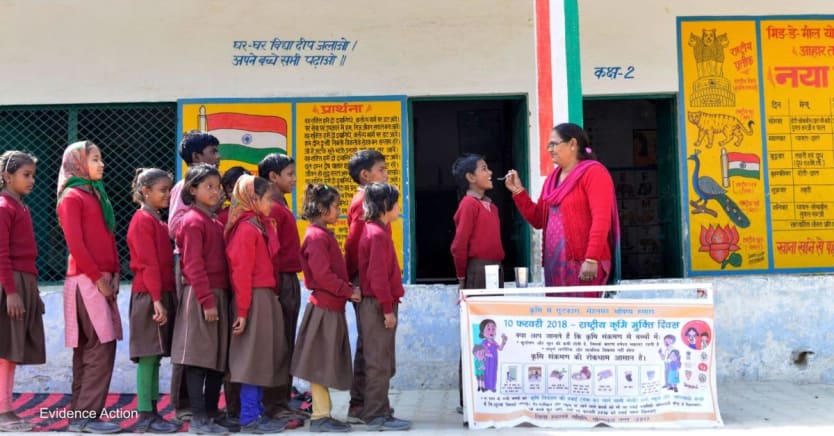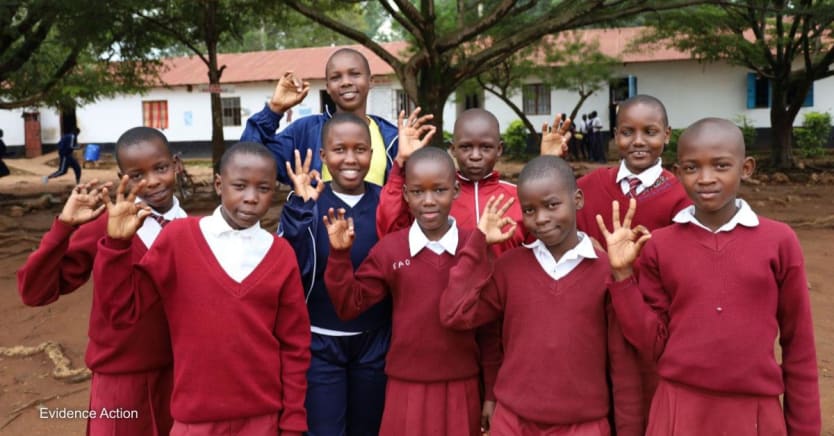Opinion: Courage over convention — new ideas to get the SDGs on track

As leaders convene for the 78th Session of the United Nations General Assembly, or UNGA 78, at the halfway point to achieve the Sustainable Development Goals, the 2030 Agenda is in crisis. With data showing just 12% of targets are on track, acceleration of mainstream operating models is simply not enough. Fresh thinking is imperative. The moment demands that the international development community — and our donors — reimagine and sharpen strategies to achieve our ambitious objectives.
Over the past decade, Evidence Action has been at the vanguard of leveraging new or underutilized channels such as school-based delivery of health products to deliver rigorously validated programs at a massive scale. We are laser focused on measurably improving health and opportunity for children and families through interventions that deliver the greatest impact for the money. In 10 years, our game-changing solutions have reached more than 500 million people across nine countries, averted over 600,000 disability-adjusted life years, and saved the lives of more than 15,000 young children.
Underpinned by robust evidence, our programs fight neglected tropical diseases, provide millions with access to safe water, and support governments to introduce low-cost treatments to address anemia, nutrient deficiencies, and congenital health challenges.
The development sector has achieved immense progress since our organization started in 2013. That same year, the U.N. declared “the Millennium Development Goals have been the most successful global anti-poverty push in history.” Yet, while key gains materialized, shortfalls were also profound — such as the failure to meet child and maternal mortality reduction targets by the 2015 deadline. Today, targets are far off the mark: According to the U.N., the pace of progress toward SDG 6 must increase sixfold if we’re to achieve universal access to safe drinking water. Meanwhile, the World Bank projects that nearly 600 million people will be living in extreme poverty by 2030.
What can the global development community do differently to catalyze results? We offer several insights from our first decade: To rethink delivery, elevate outcomes, and provide greater value for money in the fight to alleviate poverty.
Think like a design engineer
Global health programs should deeply understand and embrace the systems and practices of the communities they aim to serve. Doing so will drive forward the best solutions, lower costs, and improve accountability. Our solutions employ human-centric design tailored to local contexts. For example, the evidence tells us that treating water is one of the best ways to improve child survival. However, one key challenge has been how to drive adoption, with many social marketing programs in Kenya reaching only approximately 10% uptake. Our Dispensers for Safe Water program utilized human-centric design — placing bright blue, easy-to-use chlorine dispensers just steps away from community water sources; behavioral economics, which told us that the right price for this preventative product was zero; and community partnerships to build trust.

With our approach of placing end users at the center of our design, we have consistently achieved usage rates that are five times higher than previous approaches, and today reach 10 million people across Africa. We are now incubating a next-generation safe water technology, in-line chlorination. This solution automates chlorination and obviates the need for behavior change.
Simplify for scale
To maximize impact, we look for proven solutions and simplify to drive massive scale. For example, our Deworm the World program supports governments to treat all children at risk of worm infection — ensuring scarce resources are used for treatment instead of testing. By training teachers to administer safe, effective deworming tablets, we can reach children where they already are — in school — minimizing complexity while maximizing reach. The program has supported over 1.8 billion life-changing treatments across six countries, improving children’s education, health, and long-term well-being and resulting in $23 billion in productivity gains. Using established channels and insisting on a large scale from the outset enables swift adoption, while regular monitoring and iteration allow improved reach over time.
Outcomes over ownership
Governments are key for scale, while communities are essential to results. And open-sourcing solutions are critical because progress shouldn’t be proprietary. Like Deworm the World, our Syphilis-Free Start initiative is built on a foundation of government ownership for long-term success. With our technical assistance, governments integrate screening and treatment into routine prenatal care and set their own health targets — Liberia is on track to reach 80% of pregnant women with syphilis testing within five years, up from just 6%.
We focus resources on optimizing public sector systems including supply chain improvements, provider training, data collection, and government budget allocations. Evidence Action also openly shares learnings to advance the wider field, communicating what is truly working to avoid duplication or ineffective models.
Make hard choices
In our view, the clients in international development should always be the program’s end user. A program must effectively serve these clients, or it should not continue. At Evidence Action, we are willing to make tough decisions to enable greater impact. In 2019, we announced the end of our migration subsidy program, No Lean Season, after disappointing evidence mounted as the program scaled. We considered this a success, not a failure since it allowed us to direct our resources — and those of our donors – to interventions with greater potential for impact. Today, our Accelerator takes a venture capital-type approach to development work. While we screen many promising health and development interventions, only 2% have met our rigorous internal criteria for evidence, cost-effectiveness, and scalability — and hence are scaled up. This discipline allows us to maintain a keen focus on programs with truly outsized impact in reaching the lowest-income people.
For a decade, we’ve iterated our approach to provide the best value for money, delivering life-changing impact for hundreds of millions of people. But we can’t stop here: Enduring poverty compels us to seek proof of impact at every phase. The challenges ahead demand boldness to shut down the obsolete, creativity to design for people, and clarity to strip away needless complexity. The opportunity for progress has never been greater if we have the courage to change course and scale what works.
Read more about Evidence Action’s decade of outsized impact.
Search for articles
Most Read
- 1
- 2
- 3
- 4
- 5








